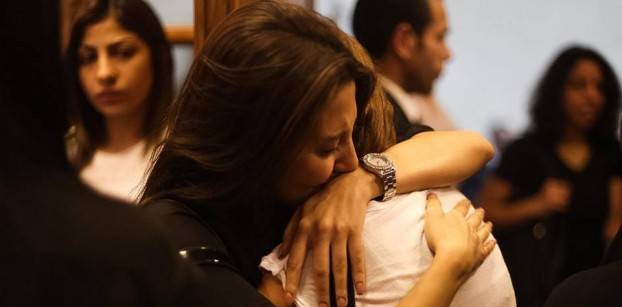Sources point to explosion on EgyptAir plane, head of forensics denies

Funeral mass held in Cairo, Egypt May 21, 2016 for Yara Hani, a cabin crew member on board EgyptAir flight MS804 who was killed when the Airbus A320 plane plunged into the Mediterranean Sea on May 19, 2016.
Cairo, May 24 (Aswat Masriya) - Shortly after sources at an investigation committee said Tuesday that human remains of survivors suggest an explosion erupted on board the doomed EgyptAir plane before it crashed, the head of Egypt's forensics dismissed the statements as unfounded.
"All what has been published in this regard is unfounded, and mere speculations that were not issued by the forensics authority or those working for it," Hisham Abdel Hamid said in a statement.
Unidentified sources at the Egypt-led committee had said earlier on Tuesday that initial forensics reveal that the victims were not eaten up by sea creatures.
Reuters quoted an official as saying, “The size of the remains points towards an explosion, the biggest part was the size of a palm. Some of the remains started arriving on Sunday in about 23 bag."
The sources did not give more details on what type of explosion it may have been, or what the reasons for it were, maintaining that the investigation will continue.
The sources added that the investigation teams found various body parts of victims and gave them to forensics officials through the Zeinhum morgue in 23 small plastic bags. The pieces of human flesh were small, and they were taken to be identified by DNA examinations.
But the head of the forensics authority denied the reports, urging journalists to be careful not disseminate "rumours" that may "harm the country's ... interests and national security."
The Egyptian military said in statements on Friday that its naval forces discovered debris, personal belongings of passengers, luggage, aircraft seats, and body parts in the Mediterranean Sea, 290 km north of Egypt’s coastal city of Alexandria.
The 12-year-old Airbus A320-232 jetliner had 56 passengers on board – 30 Egyptians, 15 French nationals, two Iraqi nationals, a British national, a Saudi national, a Portuguese national, a Belgian, a Kuwaiti, a Chadian, an Algerian, and a Canadian. It also had a 10-member crew on board.
The cause behind the crash remains unknown. The plane’s black boxes, pieces of equipment that record details about a flight and help pinpoint the cause of a crash, are yet to be retrieved.
The head of Egypt's Air Accidents Investigation department, Ayman Moqadem was cited in Ahram on Monday as saying that efforts are underway to locate the two boxes guided by the last point at which the plane could be detected on the radar of Cairo’s Air Navigation Center after the plane entered Egyptian airspace. The plane was last detected in an area where Egyptian and Greek airspaces overlap, Moqadem added.
Egypt's top prosecutor asked France and Greece on Monday to hand over to Egypt all data and audio and visual material related to the plane, including during its stay at Charles de Gaulle airport and recordings of the pilot's correspondence with air traffic controllers in Greece.
France, where the plane was manufactured, is taking part in the investigation because it is the country with the second largest number of passengers on board the flight. Three French investigators and a technical expert from Airbus arrived in Cairo Friday morning to join the investigation.
Egypt’s President Abdel Fattah al-Sisi said on Sunday that finding the black boxes is a priority for Egypt, and that an Egyptian robot submarine has been deployed in the Mediterranean for that purpose.
Urging journalists not to make speculations about the crash, Sisi said that “all scenarios are possible” and the investigation may take time.
The U.S. Navy is taking part in the search for the plane’s wreckage at sea, the U.S. embassy in Cairo said on Sunday. Moqadem said that French naval vessels will also join the search in coordination with Egyptian teams.
The Egyptian investigation committee handed the first batch of the plane’s debris to Supreme State Security Prosecution to continue the criminal aspect of the investigation, Moqadem added.
After the prosecution completes its part, it will return the debris to the investigation committee to resume its work on the technical aspect of the probe.









facebook comments